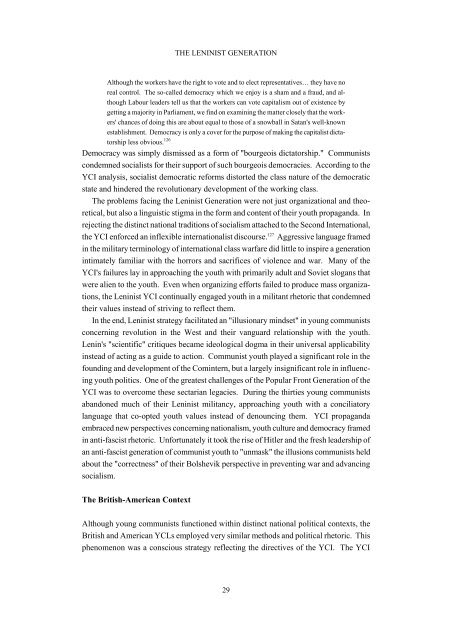Joel A Lewis Youth Against Fascism.pdf
Joel A Lewis Youth Against Fascism.pdf
Joel A Lewis Youth Against Fascism.pdf
Create successful ePaper yourself
Turn your PDF publications into a flip-book with our unique Google optimized e-Paper software.
THE LENINIST GENERATION<br />
Although the workers have the right to vote and to elect representatives… they have no<br />
real control. The so-called democracy which we enjoy is a sham and a fraud, and although<br />
Labour leaders tell us that the workers can vote capitalism out of existence by<br />
getting a majority in Parliament, we find on examining the matter closely that the workers'<br />
chances of doing this are about equal to those of a snowball in Satan's well-known<br />
establishment. Democracy is only a cover for the purpose of making the capitalist dictatorship<br />
less obvious. 126<br />
Democracy was simply dismissed as a form of "bourgeois dictatorship." Communists<br />
condemned socialists for their support of such bourgeois democracies. According to the<br />
YCI analysis, socialist democratic reforms distorted the class nature of the democratic<br />
state and hindered the revolutionary development of the working class.<br />
The problems facing the Leninist Generation were not just organizational and theoretical,<br />
but also a linguistic stigma in the form and content of their youth propaganda. In<br />
rejecting the distinct national traditions of socialism attached to the Second International,<br />
the YCI enforced an inflexible internationalist discourse. 127 Aggressive language framed<br />
in the military terminology of international class warfare did little to inspire a generation<br />
intimately familiar with the horrors and sacrifices of violence and war. Many of the<br />
YCI's failures lay in approaching the youth with primarily adult and Soviet slogans that<br />
were alien to the youth. Even when organizing efforts failed to produce mass organizations,<br />
the Leninist YCI continually engaged youth in a militant rhetoric that condemned<br />
their values instead of striving to reflect them.<br />
In the end, Leninist strategy facilitated an "illusionary mindset" in young communists<br />
concerning revolution in the West and their vanguard relationship with the youth.<br />
Lenin's "scientific" critiques became ideological dogma in their universal applicability<br />
instead of acting as a guide to action. Communist youth played a significant role in the<br />
founding and development of the Comintern, but a largely insignificant role in influencing<br />
youth politics. One of the greatest challenges of the Popular Front Generation of the<br />
YCI was to overcome these sectarian legacies. During the thirties young communists<br />
abandoned much of their Leninist militancy, approaching youth with a conciliatory<br />
language that co-opted youth values instead of denouncing them. YCI propaganda<br />
embraced new perspectives concerning nationalism, youth culture and democracy framed<br />
in anti-fascist rhetoric. Unfortunately it took the rise of Hitler and the fresh leadership of<br />
an anti-fascist generation of communist youth to "unmask" the illusions communists held<br />
about the "correctness" of their Bolshevik perspective in preventing war and advancing<br />
socialism.<br />
The British-American Context<br />
Although young communists functioned within distinct national political contexts, the<br />
British and American YCLs employed very similar methods and political rhetoric. This<br />
phenomenon was a conscious strategy reflecting the directives of the YCI. The YCI<br />
29

















